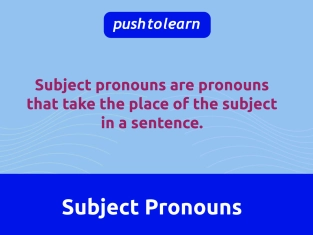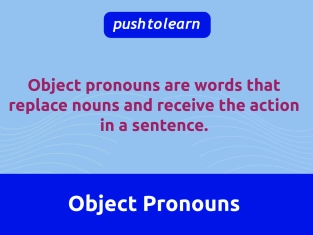by PushtoLearn
Lista de Pronombres en Inglés
Tabla de contenidos
Pronombres - Ejercicios
Estos ejercicios se centran en los pronombres.
¿Qué son los pronombres?
Un pronombre es una palabra que reemplaza a un sustantivo. Por ejemplo:
✔ Sin un pronombre:
Lisa is a teacher. Lisa loves her students.
✔ Con un pronombre:
Lisa is a teacher. She loves her students.
Los pronombres ayudan a hacer las oraciones más cortas y fáciles de entender.

Tipos de Pronombres (Con Ejemplos)
Aquí tienes una tabla que clasifica todos los pronombres en inglés:
|
Tipo |
Lista de Pronombres |
Ejemplos |
|
Pronombres Personales (Sujeto) |
I, you, he, she, it, we, they |
She is my friend. |
|
Pronombres Personales (Objeto) |
me, you, him, her, it, us, them |
They gave it to me. |
|
Pronombres Posesivos |
mine, yours, his, hers, its, ours, theirs |
This book is mine. |
|
Pronombres Reflexivos |
myself, yourself, himself, herself, itself, ourselves, yourselves, themselves |
I did it myself. |
|
Pronombres Demostrativos |
this, that, these, those |
This is my car. |
|
Pronombres Interrogativos |
who, whom, whose, which, what |
What is your name? |
|
Pronombres Relativos |
who, whom, whose, which, that |
The man who called you is my brother. |
|
Pronombres Indefinidos |
someone, anyone, nobody, everything, both, few, many |
Someone is at the door. |
|
Pronombres Recíprocos |
each other, one another |
They love each other. |
Pronombres Personales (Sujeto y Objeto)
Los pronombres personales se dividen en formas de sujeto y objeto.
✔ Pronombres de Sujeto: Se usan como el sujeto de una oración.
✔ Pronombres de Objeto: Se usan como el objeto de un verbo o preposición.
|
Pronombre de Sujeto |
Pronombre de Objeto |
Ejemplo |
|
I |
me |
I love chocolate. / She gave me a gift. |
|
You |
you |
You are my best friend. / I called you yesterday. |
|
He |
him |
He is a doctor. / I saw him at the mall. |
|
She |
her |
She likes coffee. / Give her the book. |
|
It |
it |
It is raining. / I found it on the table. |
|
We |
us |
We are going home. / They invited us to the party. |
|
They |
them |
They are my classmates. / I met them at school. |
Pronombres Posesivos
Los pronombres posesivos indican posesión y reemplazan a los sustantivos posesivos.
|
Adjetivo Posesivo |
Pronombre Posesivo |
Ejemplo |
|
my |
mine |
This is my bag. → This bag is mine. |
|
your |
yours |
Is this your book? → Is this book yours? |
|
his |
his |
This is his jacket. → This jacket is his. |
|
her |
hers |
That is her house. → That house is hers. |
|
its |
(no tiene pronombre posesivo) |
The cat loves its toy. |
|
our |
ours |
This is our classroom. → This classroom is ours. |
|
their |
theirs |
That is their car. → That car is theirs. |
✅ Regla clave: Los pronombres posesivos nunca llevan un sustantivo después de ellos.
❌ Incorrecto: This is mine book.
✅ Correcto: This book is mine.
Pronombres Reflexivos
Los pronombres reflexivos se refieren al sujeto de la oración.
|
Pronombre |
Ejemplo |
|
myself |
I cut myself while cooking. |
|
yourself |
Did you enjoy yourself? |
|
himself |
He hurt himself playing football. |
|
herself |
She made the dress herself. |
|
itself |
The dog scratched itself. |
|
ourselves |
We enjoyed ourselves at the party. |
|
yourselves |
You should introduce yourselves. |
|
themselves |
They built the house themselves. |
❌ Error común: He looked at him in the mirror. (Incorrecto)
✅ Correcto: He looked at himself in the mirror.
Pronombres Demostrativos
Los pronombres demostrativos señalan cosas específicas.
|
Singular |
Plural |
Ejemplo |
|
this |
these |
This is my book. / These are my books. |
|
that |
those |
That is your pen. / Those are your pens. |
✔ "This" y "these" se usan para cosas cercanas.
✔ "That" y "those" se usan para cosas más alejadas.
Pronombres Interrogativos
Los pronombres interrogativos se usan para hacer preguntas.
|
Pronombre |
Ejemplo |
|
who |
Who is calling? |
|
whom |
Whom did you invite? |
|
whose |
Whose bag is this? |
|
which |
Which dress do you like? |
|
what |
What is your favorite color? |
Pronombres Relativos
Los pronombres relativos introducen cláusulas que dan más información sobre un sustantivo.
|
Pronombre |
Ejemplo |
|
who |
The teacher who helped me was kind. |
|
whom |
The woman whom I met was nice. |
|
whose |
The boy whose bike was stolen is sad. |
|
which |
The book which you lent me is interesting. |
|
that |
The dress that she wore was beautiful. |
Pronombres Indefinidos
Los pronombres indefinidos se refieren a personas o cosas no especificadas.
|
Personas |
Cosas |
|
someone, anyone, no one, everyone |
something, anything, nothing, everything |
|
somebody, anybody, nobody, everybody |
✔ Ejemplos:
Someone is knocking on the door.
I don’t have anything to eat.
Pronombres Recíprocos
Los pronombres recíprocos muestran acciones mutuas entre personas.
|
Pronombre |
Ejemplo |
|
each other |
They love each other. |
|
one another |
The two teams respect one another. |
✔ Se usa "each other" para dos personas.
✔ Se usa "one another" para más de dos personas.
FAQ
¿Cuáles son los tipos de pronombres?
Hay 8 tipos de pronombres: personales, posesivos, reflexivos, demostrativos, interrogativos, relativos, indefinidos y recíprocos.
¿Cuál es la lista de todos los pronombres en inglés?
La lista de pronombres incluye: I, you, he, she, it, we, they, me, him, her, us, them, mine, yours, his, hers, its, ours, theirs, myself, yourself, himself, herself, itself, ourselves, yourselves, themselves, this, that, these, those, who, whom, whose, which, what, someone, anyone, nobody, everybody, each other, one another.
¿Es "they themselves" gramaticalmente correcto?
¡Sí! Ejemplo: They themselves completed the project.

